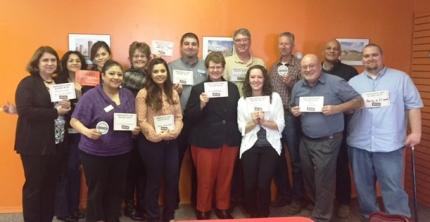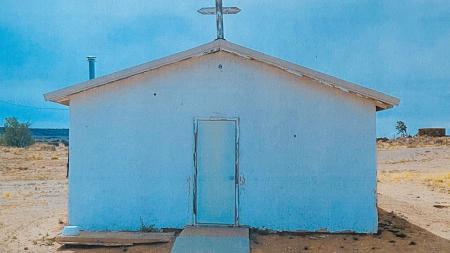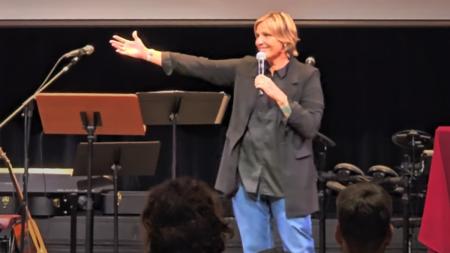Immigrants Are a Blessing Not a Burden

Sunnyside community members join Kelsey Herbert (front row, third from right) in holding up Blessing Not a Burden signs.
Kelsey Herbert says she learned that many of the members of Sunnyside Christian Reformed Church in Sunnyside, Wash. already know that immigrants are a blessing and not a burden.
On a trip to visit CRC congregations in Washington state to share the Immigrants Are a Blessing Not a Burden campaign, Herbert became aware of the demand for labor on the many dairy farms and fruit orchards in the community.
The Blessing Not a Burden campaign empowers individuals and congregations to change the conversation about immigrants in the U.S.
“Over 50 percent of white evangelicals believe that immigrants are a drain on the economy. Sunnyside confirmed for me that this is absolutely not true. They don’t believe they are a drain,” stated Herbert, immigration coordinator for the Office of Social Justice.
“Farmers in Sunnyside told us of the strong relationships they already have with their employees and how they are the greatest asset for their farms,” said Herbert.
At the same time, she said, people in the church were interested in learning about Church Between Borders, an OSJ and Office of Race Relations interactive workshop that helps people better understand the broken immigration system.
“Immigration is a very real issue in communities such as Sunnyside,” she said. “There are those in Sunnyside that are there without legal status and have a real fear of being deported. There are also employers who are in fear of losing workers and friends.”
Herbert and Sophia Henager, Policy Analyst and Advocacy Fellow with OSJ, recently traveled to CRC congregations in Washington, including Sanctuary CRC in Seattle, Family of Faith CRC in the Tri-Cities, and Sunnyside CRC in Sunnyside, to discuss Church Between Borders and the Immigrants Are a Blessing Not a Burden campaign.
Generally, they spoke about the campaign in lunch meetings with students, community leaders, business people, pastors, educators, and immigration reform advocates.
In the evening, they presented the Church Between Borders workshop, helping church members become more aware of how the U.S. immigration system actually works.
“Many people have opinions about immigration without understanding how our immigration system works, which makes sense because it’s complex,” said Henager.
“Our workshop helps people understand the basics of immigration and helps communities begin a constructive conversation based on the Bible and facts. They learn that we have a 50-year-old system that needs to be updated. Many people can agree on that.”
There are more than 11 million undocumented immigrants in the U.S., many of whom live in the shadows and yet contribute important things to the communities in which they live. Seventy percent of all farm workers in the U.S. are here without legal status, said Herbert.
“Both immigrants and employers are forced to work outside of the law,” she said. “They are caught in a very difficult situation. For many immigrants, there is no line they can wait in in order to seek legal status and our immigration system does not grant enough visas for employers to hire immigrants legally. It’s a huge problem for everyone.”
Immigration issues varied depending on the CRC congregations and communities in which they met.
For instance, they spoke to people in the Seattle area of the demand for skilled high-tech workers. Unfortunately, they learned, the current system makes it very challenging for skilled workers from outside the U.S. to receive visas to come to the country to fill the open positions, said Henager.
In one of their meetings at Gonzaga University in Spokane, they heard from a young man who has legal status because he was born in the U.S., but his family is severely limited in what they can do because they are not here legally.
“He stood up and shared very openly,” said Henager. “He told us that the negative rhetoric in the U.S. characterizes his family as a burden, but he knows this is not true. We could tell he was empowered by our campaign.”
Many people are looking for things they can do in the face of negative rhetoric. While there is no meaningful legislation to advocate for at the moment, the campaign is a tool to challenge myths surrounding immigration and spread the truth that immigrants are a blessing not a burden, shared Henager.


